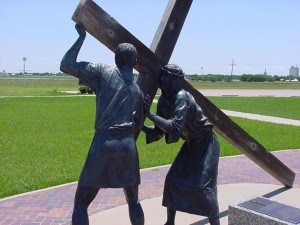What? Me Sacrifice?
“Whoever does not carry the cross and follow me cannot be my disciple. For which of you, intending to build a tower, does not first sit down and estimate the cost, to see whether he has enough to complete it?” —Luke 14:27-28
 The Gospel lesson for this week (Luke 14:25-33) is one of those lectionary texts that pastors might be inclined to turn away from, what with Jesus’ radical teaching about discipleship. In it, Jesus uses what is referred to as hyperbolic (or extreme) language to make his point—that in order to follow him one must make some serious sacrifices—sacrifices as extreme as giving up one’s family, possessions, even one’s life.
The Gospel lesson for this week (Luke 14:25-33) is one of those lectionary texts that pastors might be inclined to turn away from, what with Jesus’ radical teaching about discipleship. In it, Jesus uses what is referred to as hyperbolic (or extreme) language to make his point—that in order to follow him one must make some serious sacrifices—sacrifices as extreme as giving up one’s family, possessions, even one’s life.
David Lose, one of my favorite theologians (and Professor of Preaching at Luther Seminary), writes a weekly reflection designed to encourage “Working Preachers.” This week Dr. Lose tackled this text and the demand Jesus makes of us as disciples. Interestingly, Dr. Lose acknowledges that while we mainline churches tend not to expect this kind of sacrifice of our already over programmed, overworked, over-stressed parishioners—we may do so at our own peril.
Because church has become one of the many options folk have for how they spend their Sunday, because we are shy to claim our discipleship as followers of Jesus in this post-modern, post-Christian era, and because we believe we have to compete with all of the other ways that people “consume”—we have set the sacrifice bar pretty low. We think that in order to keep people coming (or to get new people to come) we have to be the easy-access-good-guys who make church participation uber-easy. We think that people today aren’t willing to make sacrifices.
Dr. Lose writes, “And so we emphasize God’s grace and work our schedules for fellowship, education or youth group around school calendars, [kids sports], and community activities as much as possible. Yet this [bible] passage makes me wonder whether we’ve missed something essential about the Christian faith. This isn’t about our eternal destiny. This is about the character of our Christian lives. Christianity, I’ve come to realize, is a way of being, a way of living, a way of doing things differently because of living “in Christ” (to borrow Paul’s favorite phase). Yet for much of my ministerial career I’ve preached and written as if it’s primarily a way of thinking….sometimes I wonder if part of our decline is that we’ve spent so much time stressing what we need to think and believe instead of talking about what we can and should — indeed, are called to — do.”
The truth is postmodern or not people make sacrifices all the time. They sacrifice for their children to play sports or cheer or dance or play an instrument or (insert your child’s extracurricular activity). They sacrifice to save money for college. They sacrifice to get the next promotion. They sacrifice favorite treats and time at the gym to stay healthy and exercise. And there are people who sacrifice a great deal to help to lead the church. We are willing to sacrifice for the things that are important to us, putting ‘our money where our mouth is’, so to speak. Or as Jesus said elsewhere in scripture, “For where your treasure is, there your heart will be also.”
 Psychologists have determined that the more we sacrifice for something the more we value it. Some would suggest that we have made it too easy to be a part of our churches. Jesus certainly did not suggest it was easy to be a follower. On the contrary, he asked us to do things like love our neighbors (all of them), pick up his cross, forgive seven-times-seventy-times, sell everything and give to the poor, dine with windows and tax collectors. You get the picture. Being a follower of Jesus is not the same as being a member of a church.
Psychologists have determined that the more we sacrifice for something the more we value it. Some would suggest that we have made it too easy to be a part of our churches. Jesus certainly did not suggest it was easy to be a follower. On the contrary, he asked us to do things like love our neighbors (all of them), pick up his cross, forgive seven-times-seventy-times, sell everything and give to the poor, dine with windows and tax collectors. You get the picture. Being a follower of Jesus is not the same as being a member of a church.
Are we expecting too little of ourselves if the travelling soccer team or the job-we-do-not-love but which puts food on the table is sacrifice-worthy and following Jesus is not? What Jesus is saying in this text is that the life he calls us to, the beloved community we are encouraged to create, the call of God on our time, talent and treasure should be the priority (or, at least have equal priority to the other stuff of our lives).
Dr. Lose in his blog post suggests that we might look at the long arc of our lives and ask ourselves, “What is important to me, what do I hope for myself and my family.” Not simply because we should, but because the “abundant life and way of discipleship that Jesus both promises and announces also takes sacrifice — not to earn God’s grace but to live into the discipleship life that grace makes possible. This isn’t about our eternal destiny…God has already taken care of that. This is about the caliber and character of our Christian lives. And, like anything else worth doing, discipleship takes time, energy, work, and practice — in a word, it takes sacrifice.” May it be so for you.
Rev. Wendy Miller Olapade (revwdmiller@comcast.net)
